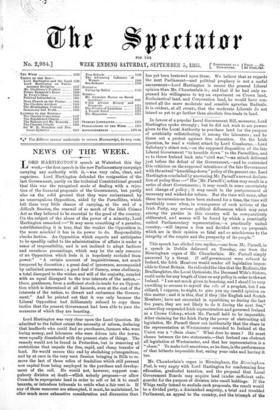Lord Hartington was very clear upon the Land Question. He
admitted to the fullest extent the necessity of reform, declaring that landlords who could find no purchasers, farmers who were losing money, and labourers who were driven into the towns, were equally dissatisfied with the present state of things. The remedy would not be found in Protection, but in removing all restrictions that impede the free, rapid, and cheap transfer of land. He would secure this end by abolishing primogeniture, and by at once in the very next Session bringing in Bills to re- move the last of those relics of feudalism which still prevent new capital from being employed in the purchase and develop- ment of the soil. He would not, however, support com- pulsory division at death—v4lich nobody proposes—or allow Councils to expropriate land in order to sell or let it to small tenants, or introduce tribunals to settle what a fair rent is. If any of those measures are attempted, it must, he maintained, be after much more exhaustive consideration and discussion than has yet been bestowed upon them. We believe that as regards the next Parliament—and political prophecy is not a useful amusement—Lord Hartington is nearer the general Liberal opinion than Mr. Chamberlain is ; and that if he had only ex- pressed his willingness to try an experiment on Crown land, Ecclesiastical land, and Corporation land, he would have con- tented all the more moderate and sensible agrarian Radicals. It is evident, at all events, that the moderate Liberals do not intend as yet to go farther than absolute free-trade in land.


































